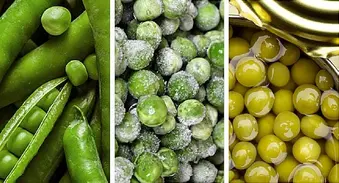Food for Thought: Fresh, Frozen, or Canned?

Some vegetables start losing vitamins:
- When they’re picked
- After 24 hours
- After 2 days
Don’t let your veggies linger. About half the vitamins can be gone in just a few days if the produce isn’t kept cool or canned. Even items kept in the fridge can lose vitamins in a week or two.
Fresh spinach is better for you than frozen.
- True
- False
If they’re fully ripe and frozen or canned quickly after being picked, some fruits and veggies can be more nutritious than the fresh ones at the grocery store. For instance, frozen spinach has higher levels of many nutrients, including calcium and vitamin E. Not all canned or frozen fruits and vegetables offer better nutrition than they do when they are fresh. Neither frozen green peas nor canned peaches, for instance, have more vitamin C than the ones you get in the produce section of your grocery store. But taking time to compare the nutritional value of frozen or canned produce with what you get from fresh fruits and vegetables can help you find easier ways to provide the nutrients you want your family to get.
It’s safe to eat vegetables that have been frozen for years.
- True
- False
There’s no guarantee they’ll still taste good, though. And they won’t be as good for you as they might have been had you eaten them sooner. If you’re concerned about quality and nutrition, eat veggies stored in a standard freezer/fridge combination within 6 weeks. If they’re in a freezer chest, you can keep them up to 3 months.
When you freeze food, it kills bacteria.
- True
- False
Temperatures below 0 degrees will keep it from growing. But once the food thaws, bacteria will be back in action, just like nothing ever happened.
You can refreeze vegetables if they’ve been thawed for less than:
- 2 hours
- 6 hours
- 12 hours
Food may be safely refrozen if it still contains ice crystals or is at 40 °F or below. If it was thawed in the refrigerator, it is safe to refreeze. It should also be ok to refreeze if it was left outside the refrigerator, for less than 2 hours, and still feels refrigerator-cold. Otherwise, it’s best to toss them.
You can keep that can of corn on the shelf:
- Up to 1 year
- Up to 2 years
- 2 to 5 years
Potatoes, carrots, spinach, beets, peas, and pumpkin should last that long, too. But don’t wait to use canned fruits and vegetables that are high in acid. Juices, tomatoes, grapefruit, pineapple, apples, peaches, pears, plums, berries, and pickles should be eaten within 12 to 18 months.
You shouldn’t buy cans that are:
- Bulging
- Dented
- Both
There’s a reason those misfit cans are always the last ones left on the shelf, and it has do with bacteria. A bulge can mean they’re growing inside, and a dent along the seams can be the way they got in.
Some canned vegetables you buy at the grocery store may have lead in them.
- True
- False
The U.S. made food companies stop using lead in cans in 1995. The FDA also prohibits the sale in America of foreign foods and products that have lead. Even so, some foods packed in cans with lead are sold in this country. Watch out for cans with wide silver-gray seams (where the body and lid overlap). Over time, the lead can leak into the food inside.
This works well for freezing food:
- Aluminum foil
- Glass jar
- Wax paper
The wrong container can lead to freezer burn and make your fruits and veggies smell weird – and no one wants that. Put them in something that’s easy to seal, keeps out water and air, and will stand up to the extreme temperature of your freezer.Make sure to get wide-mouth, dual-purpose glass jars made specifically for freezing and canning. Other good options are plastic freezer containers and freezer bags.